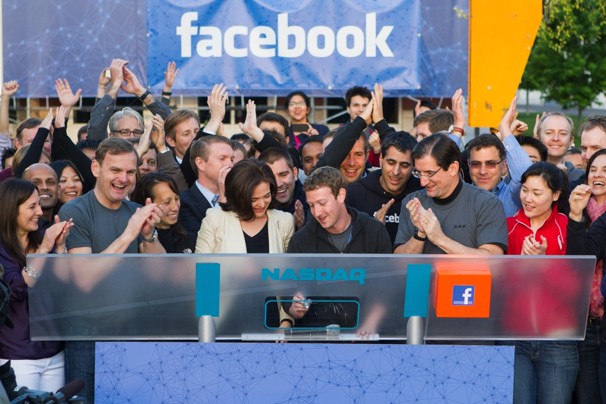From Bloomberg:
Ryan Cefalu, who lives with his wife and two kids in Baton Rouge, Louisiana, saw in Facebook’s much-anticipated initial public offering a chance to buffer his retirement fund. His expectations fizzled along with the stock within the first minutes of trading.
“It’s disheartening to know that things get over-hyped,” Cefalu, a 34-year-old data-systems manager who spent about $4,000 on the stock, said in an interview.
Let’s assume that quote isn’t taken out of context, although it’s hard to imagine what context it could be taken out of. The most overhyped IPO in history, and Mr. Cefalu is expressing surprise at what, exactly? He’s implying that he bought the stock before it was overhyped, or that said hype has something to do with his losses.
Here’s another fool who deserved to soon be parted from her money:
“I thought it would be fun to get in on the initial frenzy,” said Linda Lantz, an online marketer in Granite Bay, California, who bought 100 shares. “Now it makes me think ‘Oh God, should I bail or is it going to come back?’”
Fun? Where is the fun? Is it inherently “fun” to have a line in your E*Trade account that reads:
100 FB NASDAQ 5-17-2012 $39.84?
If you want fun, go target shooting or buy a kitten. (If you want lots of fun, combine the two.) More to the point, if you’re investing for fun, you’re in even worse shape than a guy who goes into debt to film a movie and then begs for people to cover the expenses.
You invest to make money. Sweet feathery Jesus, how much more obvious a point could this be? Look, we get that an iPad or a Birkin bag conveys something about your status and tells passersby that you want them to think you have disposable income. But Facebook stock? You do know that corporations no longer issue physical certificates, right? You can’t literally show your stock purchase off to people unless, again, you invite them to look at your computer screen while you’re logged into your brokerage account.
Michael McClafferty, a freshman finance major at Michigan State University, saw his “first big investment” turn into a $3,000 loss when he sold the shares at $35.
“I didn’t want to lose more,” McClafferty said. “I didn’t know what to do.”
The 19 year-old student estimates he spent $8,000 more than he wanted to while repeating orders that wouldn’t go through on the first day, and failing to cancel them because of the technical problems.
Anyone want to bet on whether Mr. McClafferty has incurred any student loans? We hope to God that he has rich parents financing the education that he’s getting but that isn’t taking. This would be slightly more forgivable if he were majoring in sociology.
Some out-and-out lying doesn’t hurt, either:
Pat Brogan, a Yahoo! Inc. manager who trades on sites run by E*Trade and Fidelity in her spare time, called the experience of buying Facebook stock the “biggest fiasco” in her 30 years of day trading.
Two points from Ms. Brogan’s debacle. Number 1, no one day-trades for 30 years, for the same reason that no one plays day-Russian Roulette, day-wrestles grizzly bears or day-shoots up heroin for 30 years.
Also, risking your own money in the hopes of returns isn’t something you do “in (your) spare time.” It requires a little more intellectual commitment and wariness than do quilting or playing Gran Turismo 5.
Alright, a 3rd point. What was she expecting? Of the thousands of equities she could have chosen to purchase last week, she picked the one with zero history as a public company. If you’d asked her “Why’d you buy Facebook today, instead of Hewlett-Packard or Time Warner?”, what do you think she would have answered? Or any other sheep who thinks investing is about status and internal feelings of hipness rather than making a mother-loving profit?
Because they thought they could beat the system. They’d be the ones to buy Facebook at (its opening price + x), then sell it hours later at (its opening price + x + y). Which is to say, they had to know they wouldn’t be the absolute first in line, right? And that the people who did get in earlier were entitled to their own profit, right? Still, Ms. Brogan and her compatriots had it all figured out. They’d get in early enough to allow those preceding investors their profit, then enjoy their own as they cashed out to the next round of lemming/piranha hybrids on the horizon.
Oh, who are we (and they) kidding? The day traders and speculators who tried to buy Facebook stock as early as possible would have held onto it had it risen. Fortunately for them, or at least for us, it didn’t.
But no, the alleged “30-year day trader”, the college kid, and the Louisianan looking to settle his retirement in one day know more than the insiders do.
The chance of you purchasing Facebook stock at the appropriate minute on the day of its IPO, then selling it within a day or two at a substantial profit, is nonexistent. First, you don’t know as much as the stock’s underwriters do, and second, if you’re greedy enough to try and time the market like that, you’re not going to be satisfied with a modest $4 or $5 gain. You’ll want that baby to rise to hundreds of dollars a share, just as AOL (now around $28) and Yahoo! ($15 or so) did. Otherwise you’re alleging that the avarice that got you there in the first place can be kept in check at certain points. Come on.
We do way too many sports analogies on this site, but that’s not going to stop us from doing another one. If you sink a half-court shot to win a Kia Sorrento at halftime of an NBA game, even if you hit nothing but net, the home team’s general manager is not going to offer you a contract. Not even at the league minimum. You got lucky. The ability to consistently hit half-court shots is as rare, and as practically useless, as the ability to time when to get into and when to get out of IPOs. We say “practically” useless because you can’t build an offense around 3-point attempts taken 47’ from the basket, any more than you can build an investing strategy around knowing when to board and disembark the IPO train.
Twitterer @DubaiAtNight, who was one of the most insightful commenters on Control Your Cash back when we allowed comments, put it best:
@bettykin I enjoy seeing people complain that Facebook didn’t “pop” on day 1. So, it maximized its own capital intake? And the problem is?
— DubaiAtNight (@DubaiAtNight) May 23, 2012
Imagine if had been Koch Industries that went public. (As if. The Koch brothers aren’t stupid.) The biggest private company in the world then opens itself up to general investors, and a combination of nefarious underwriting and technical glitches leads to a bunch of unprepared dilettantes losing their money. The U.S. Senate, the President and the SEC wouldn’t be able to land on Koch management fast enough. The 1%, keeping the 99% down, etc., etc. Meanwhile, if a tousle-headed 20-something with an affinity for hoodies is at the helm, and if the product in question is something commonplace, benign, and beyond most people’s technical understanding, no big deal.
Investing isn’t a freaking game. It can be fun and rewarding, but a) not over the course of an afternoon and b) it takes work. Here, read this and step back from the maelstrom. You can thank us when you’re rich.




